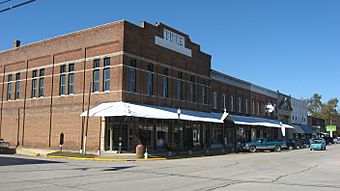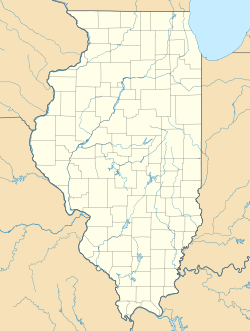Palestine Commercial Historic District facts for kids
Quick facts for kids |
|
|
Palestine Commercial Historic District
|
|

Buildings in the district
|
|
| Location | 101-223 and 106-322 S. Main St., Palestine, Illinois |
|---|---|
| Area | 8 acres (3.2 ha) |
| Architect | John W. Ransom; Frank Corbin |
| Architectural style | Late Victorian, Early Commercial, Classical Revival |
| NRHP reference No. | 95000985 |
| Added to NRHP | August 4, 1995 |
The Palestine Commercial Historic District is a special area in Palestine, Illinois. It's like a preserved snapshot of the past. This district includes parts of Main Street, where many old buildings still stand. It's a place where history comes alive through its architecture and stories.
This historic district was officially recognized in 1995. It was added to the National Register of Historic Places. This means it's considered very important for its history and unique buildings.
Exploring the Historic District
The Palestine Commercial Historic District covers about 8 acres. It includes 31 buildings. Out of these, 25 are called "contributing buildings." This means they help tell the story of the district's history. These buildings show how the town looked and worked long ago.
Unique Architecture and Features
Many buildings in the district have interesting designs. They show styles like Late Victorian and Classical Revival. Some businesses even have special metal fronts. These were made by a company called George L. Mesker & Co. These metal facades add a unique touch to the buildings. They are a cool example of old-time building materials.
Important Places and People
The district is home to some very notable spots. One is the Fife Opera House. This building is so important that it's listed on the National Register of Historic Places all by itself! It's a great example of the grand buildings from the past.
The district also includes Mary Ann Gogin's general store. Mary Ann Gogin was a very special person. She was one of the first women in Illinois to own and run her own business. Her store is a reminder of how women helped shape the commercial history of the state. It shows how people worked and shopped in earlier times.
 | James Van Der Zee |
 | Alma Thomas |
 | Ellis Wilson |
 | Margaret Taylor-Burroughs |



